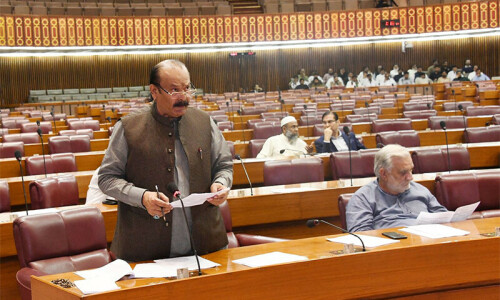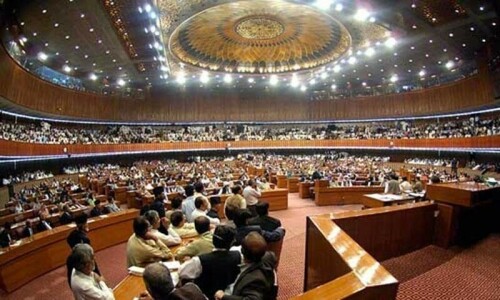IN an unprecedented move, the National Assembly passed the Contempt of Majlis-i-Shoora (Parliament) Bill, 2023, on May 15. The bill will, however, need to be passed by the Senate and receive presidential assent before becoming the law.
Even after going through that process, the law may be challenged in the superior courts that may withhold the implementation of the law, as the Supreme Court did in the case of the Supreme Court (Practice and Procedure) Act, 2023, passed by the joint session of parliament last month.
The Contempt of Parliament Bill, 2023, as passed by the National Assembly, prescribes a punishment of up to six months in prison and a Rs1 million fine, or both, for anyone found guilty of holding parliament or its members in contempt. ‘Contempt’ has been defined as “breaching the privileges of a lawmaker; violating the laws guaranteeing the immunities or privileges of lawmakers; failing to obey the orders of parliament or its committees; refusing to give evidence or recording a false statement before a committee; attempting or influencing a witness to prevent him from providing evidence, producing documents or appearing before the committee; and failing to provide any documents or submitting tampered documents before a House or a committee”.
The rationale behind the bill seems to have been based on Article 66 of the Constitution, which deals with the privileges of members of parliament.
Sub-article 66(3) states that the “provision may be made by law for the punishment, by a House, of persons who refuse to give evidence or produce documents before a committee of the House when duly required by the chairman of the committee so to do — provided that any such law (a) may empower a court to punish a person who refuses to give evidence or produce documents; and (b) shall have effect subject to such order for safeguarding confidential matters from disclosure as may be made by the president”.
While the bill passed by the National Assembly provides for safeguarding confidential matters from disclosure, it does not empower a court to punish a contemner.
Instead, it proposes the constitution of a five-member ‘contempt committee’ consisting of a member of the National Assembly nominated by the Speaker, two members from the National Assembly, one nominated by the Leader of the House and the other by the Leader of Opposition and two members from the Senate, one nominated by the Leader of the House and the other by the Leader of Opposition.
The bill also provides for the election of the chairperson of the committee by the committee and the secretary, National Assembly to act as secretary of the contempt committee.
The contempt law move is seen as the result of the tension between the NA and the SC.
An appeal against a decision of the contempt committee under this law may be filed before an appellate forum, consisting of the Speaker of the National Assembly and the Senate chairman, while the Senate secretary will act as secretary to the appellate forum.
A schedule of offences has been made a part of the proposed law. The Speaker, who will consult the Senate chairman, has been authorised to amend the schedule.
Until now, and in the absence of any law, the questions regarding the contempt of legislators were being dealt with under the Rules of Procedure and Conduct of Business of each legislature. A separate chapter in the rulebook of each legislature deals with the privileges of the members.
The rules regarding privileges of all the six legislatures are almost similar and provide the details of privileges and the procedure to raise questions of privilege in the respective Houses. But, surprisingly, these rules don’t have even basic details about the punishment for breaching the privilege of legislators, committees and Houses.
This lack of details about the punishment provides another rationale for framing a contempt law for parliament. Once this law is in place, it is quite likely that the four provincial assemblies may also frame similar laws to address the issue of contempt of the respective assemblies.
Interestingly, the rules pertaining to the Indian parliament, too, do not provide details of punishment for the breach of parliamentary privilege though the rules mention the possibility of framing a law to provide details about possible punishment. The Indian parliament, apparently, has not attempted to frame a contempt law for the legislature so far.
Apparently, the need for a law on the contempt of parliament in Pakistan was felt in the backdrop of the ongoing confrontation between parliament and the Supreme Court. While contempt of court laws exist in Pakistan, and at least one elected prime minister — Yousuf Raza Gilani — who enjoyed the confidence of the majority of National Assembly members, was not only sacked but also disqualified from contesting elections for five years by the Supreme Court in 2012 on charges of contempt of court, there is no such ‘weapon’ in the ‘parliamentary arsenal’.
Parliament, the National Assembly to be precise, has lately defied orders of the Supreme Court to approve a supplementary grant of Rs21 billion for holding elections to the Punjab and KP assemblies after they were prematurely dissolved by the PTI-supported provincial chief ministers on the instructions of party chairman Imran Khan.
Prime Minister Shehbaz Sharif, the federal cabinet and National Assembly members apprehended that they might also be made to face the same fate as Mr Gilani by the Supreme Court. The contempt of parliament law is apparently an effort by parliament to engineer a tit-for-tat move. It, however, remains to be seen how far the proposed law will help parliament and the parliamentarians safeguard their privileges.
The writer is president of the Pakistan Institute of Legislative Development And Transparency.
president@pildat.org
Twitter: @ABMPildat
Published in Dawn, May 20th, 2023














































Dear visitor, the comments section is undergoing an overhaul and will return soon.